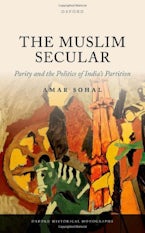- Home
- Religion in Transforming Africa
- religion
- political science
- Beyond Religious Tolerance

Beyond Religious Tolerance
Muslim, Christian and Traditionalist Encounters in an African Town
Edited by: Insa Nolte, Olukoya Ogen and Rebecca Jones
Series: Religion in Transforming Africa
336 Pages
- Hardcover
- ISBN: 9781847011534
- Published By: Boydell & Brewer
- Published: January 2017
$80.00
In engineering, tolerance is the permissible limit of variation in a part or system, or the extent of hostile conditions that a material can withstand. In medicine, tolerance is the capacity of a body to endure a substance or situation before damage occurs. In either case, as in law and culture, tolerance commonly implies adversity, and the willingness and ability to endure circumstances that are fundamentally bad, wrong, offensive, and otherwise intolerable. However, according to the contributors to this important, timely, and well-constructed collection, this is not how the residents of the Yoruba town of Ede in Nigeria think about religious difference. Indeed, as they explicitly say, members of the three main religious communities do not “tolerate” religious (and other) difference at all, but rather feel empowered by it.
This is especially surprising since, after the emergence of Islamic extremism in general and Boko Haram in particular, Nigeria is hardly the public or scholarly image of religious co-existence. Yet despite the fact that Ede is a majority-Muslim locale and that Islam enjoys a sort of hegemony, embracing religious diversity is an explicit point of pride in Ede. Not only does “traditional” culture encourage diversity (sometimes viewing the differences between individuals as a matter of personal fate), but it is the formal duty of the “king” (tìmì) of Ede to stand above religious partisanship and to support and unify all of the local religious communities. The second chapter explains the role of kinship in Yoruba culture, surveying three key rulers who introduced Sàngó worship, Islam, and Christianity respectively, but nevertheless (for the most part) acted as the head of all religions. The subsequent chapters move systematically through the three religions, admittedly giving more attention to the “world religions” (Islam and Christianity) than to local traditional orisa beliefs. Even so, it becomes immediately clear that traditional religion persists in Ede and that many Muslims and Christians participate in at least some orisa activities.
Two of the themes of the volume are the spatial distribution of religion in Ede and the diversity within each religion. The fifth chapter discusses the organization of the town into compounds which are significantly free to determine their own policies toward religious difference. Although Muslim majorities in a specific compound are able to enforce Islamic norms, we also see that compounds handle religious diversity quite differently: in Amusa Saheed Balogun’s words, local Muslims “do not subscribe to one culturally or locally mediated understanding of Islam, nor do they envision kinship and the toleration of Christianity and traditional practice in only one form” (121). Another angle on internal diversity comes in the sixth chapter, which explores Tablighi Jamaat, a Muslim reform movement that does not represent all of Ede’s Muslims.
We also get a treatment of land struggles between the local population and the Baptist Church, followed by a glimpse inside the Federal Polytechnic, a modern educational institution with a high proportion of Christians. Although the Polytechnic is a “secular” space, religious difference is also carefully managed there, in such a way that less-religious students feel that religion is given too much organizational centrality. The ninth chapter examines religious inclusion across generations, while the tenth chapter raises the vital question of religious difference and gender in the context of interfaith marriages. Women are often expected to adopt the religion of their husbands, but it does not always work out that way. The eleventh chapter presents the findings from a survey on religious attitudes, which concludes that “religious differences in Ede are shaped both by different forms of coexistence and encounter that include but are not limited to toleration, and by forms of community that transcend religious difference at different levels” (256).
Ede is no religious paradise; hostilities and conflicts do arise, and Islam has preeminence. Yet at a moment when many Westerners perceive an inevitable “clash of civilizations” between Islam and the West/Christendom, Beyond Religious Tolerance offers a valuable alternative where Americans and Europeans would be least likely to look for one. It is fair to say, and the contributors essentially do say, that a deep cultural tradition of acceptance of difference overarches religious particularity in Yoruba country, and we scholars would add that religions are not as sharply bounded and all-defining as has commonly been assumed. At the highest theoretical level, the book may perhaps inaugurate an investigation into “the formations of tolerance” akin to Talal Asad’s “formation of the secular,” revealing that both tolerance and secularism as typically conceived are products of Western cultural and historical experience, which can be and have been conceived differently—if at all—in other times and places.
Jack David Eller is associate professor of anthropology (retired) at the Community College of Denver.
Jack David EllerDate Of Review:December 4, 2017
Insa Nolte is Reader in African Studies at the University of Birmingham, and Visiting Research Professor at Osun State University, Osogbo. She is President of the African Studies Association of the UK (2016-18) and Principal Investigator of the ERC project "Knowing Each Other: Everyday Religious Encounters, Social Identities and Tolerance in Southwest Nigeria".
Olukoya Ogen is Provost of Adeyemi College of Education, Ondo; Professor of History at Osun State University, Osogbo; and Visiting Senior Research Fellow at the University of Birmingham. He is the Nigerian coordinator of the "Knowing Each Other" project.
Rebecca Jones is Postdoctoral Research Fellow on the "Knowing Each Other" project. Her book, A Cultural History of Nigerian Travel Writing, will be published by James Currey in 2017.











